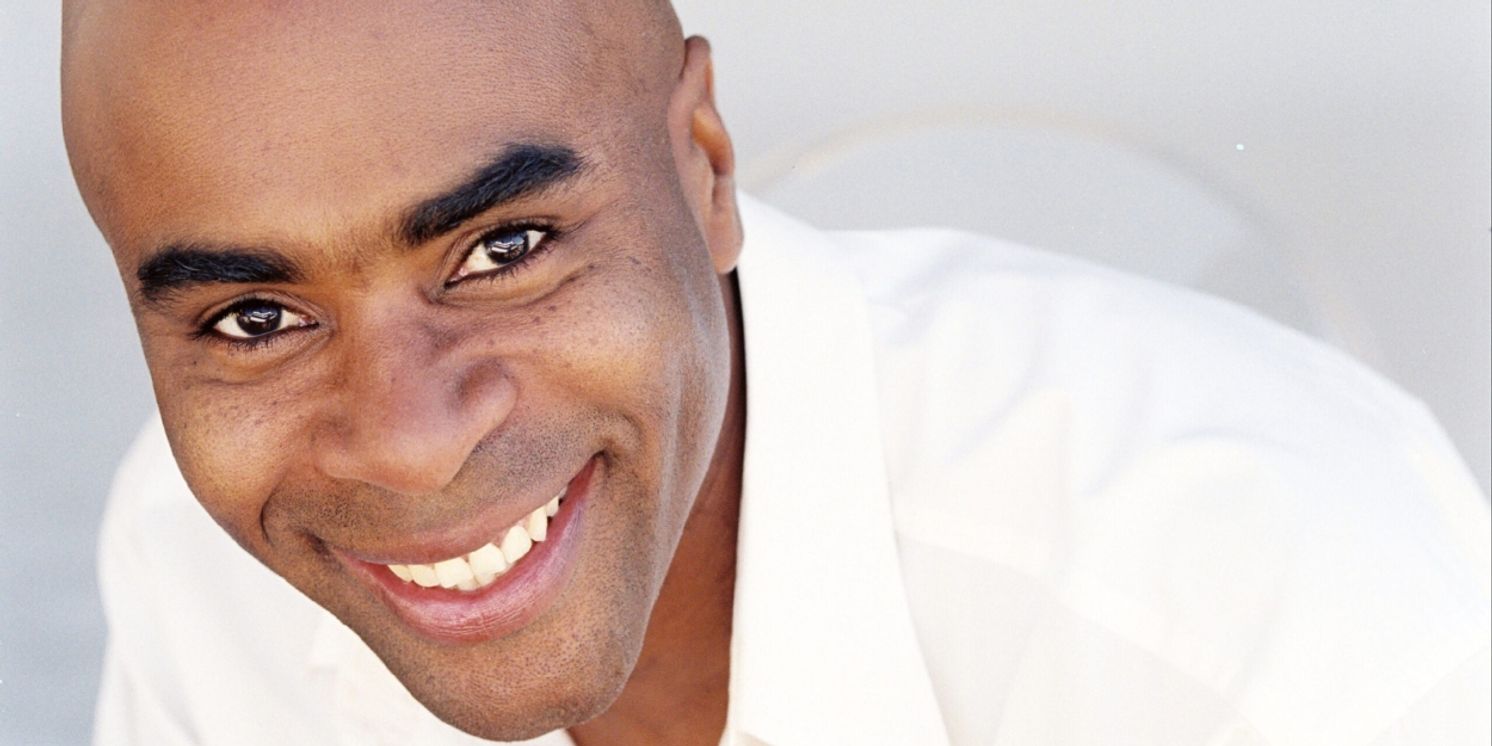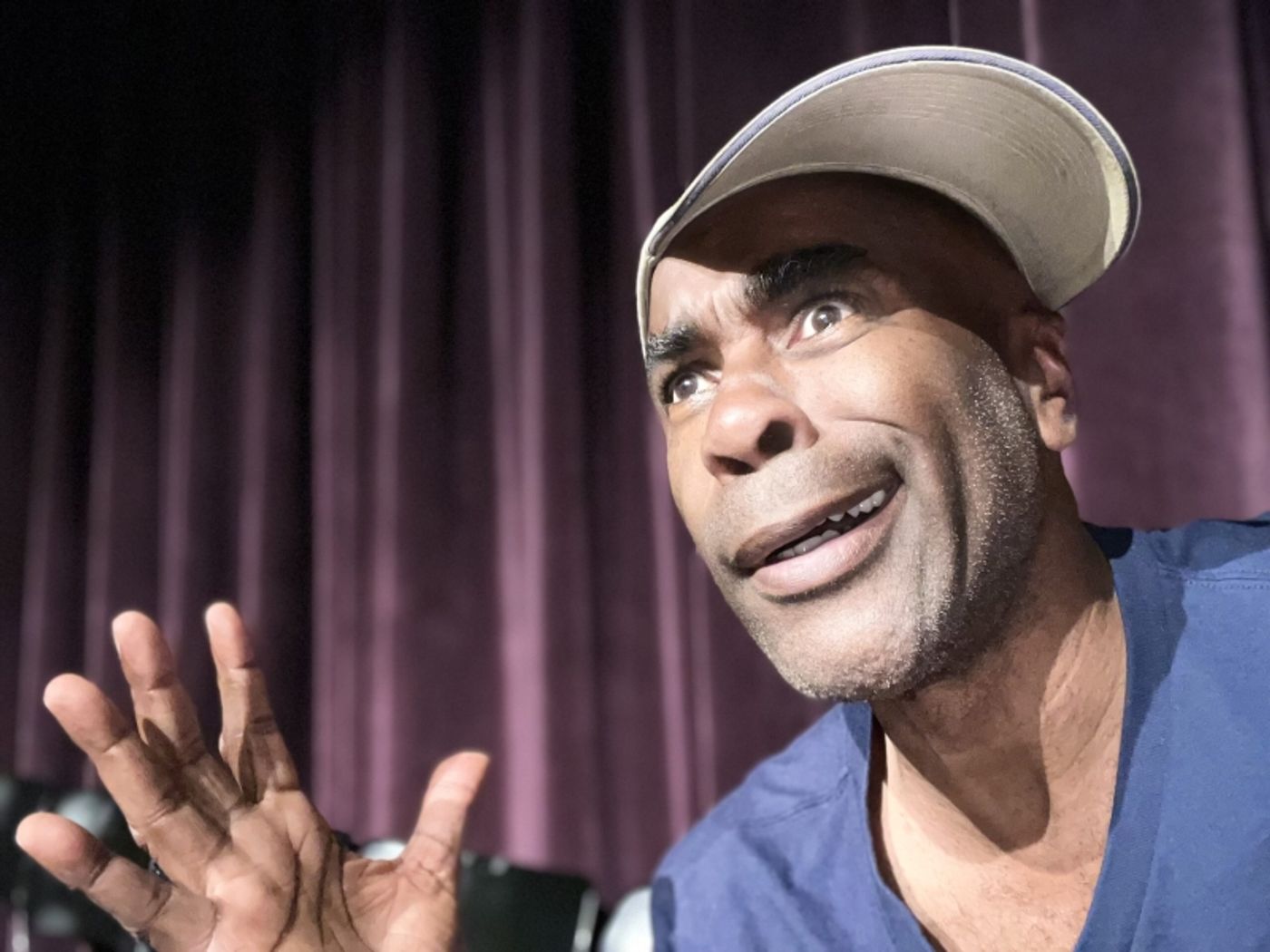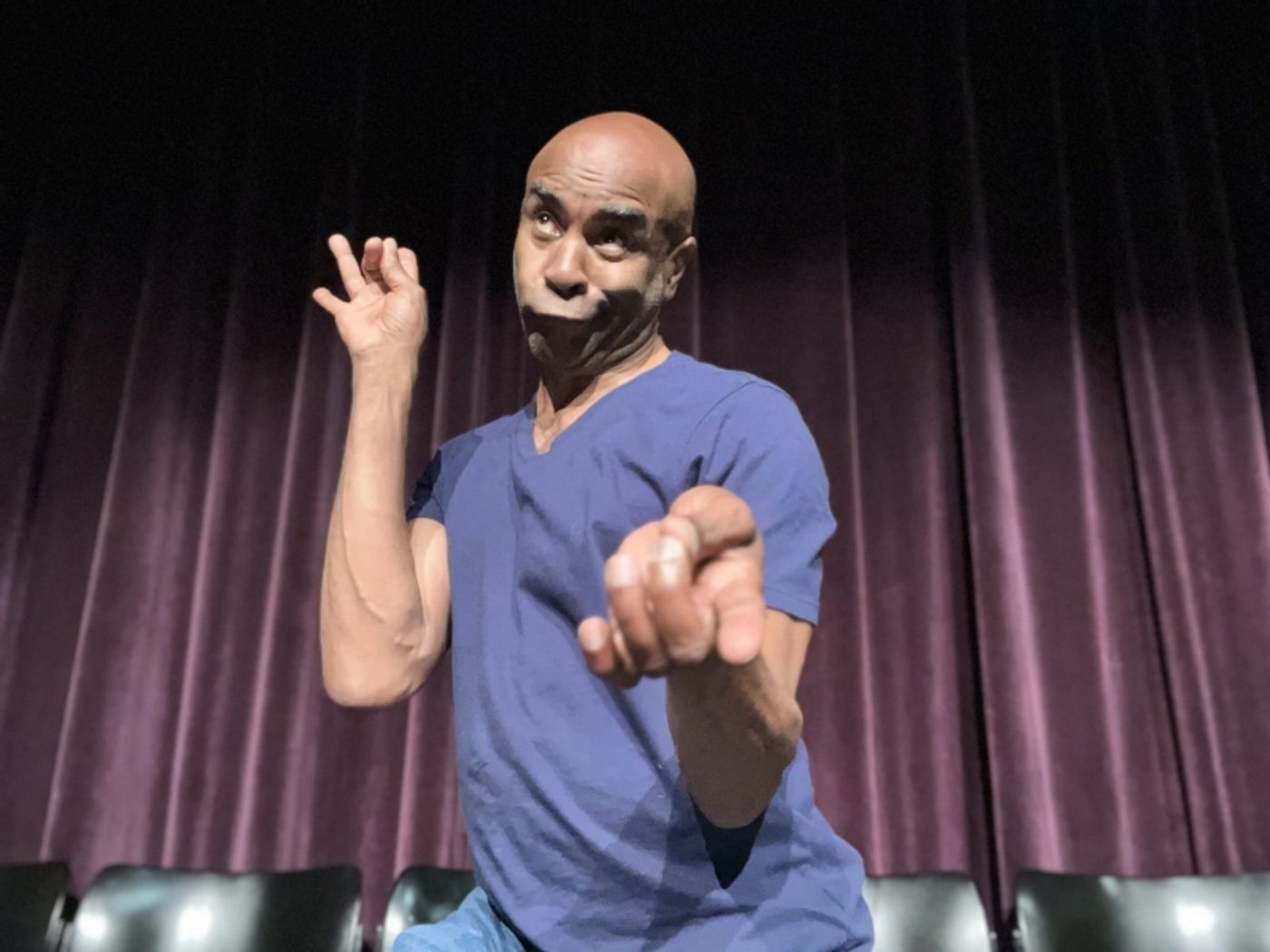Interview: Don Reed of THE DMV at The Marsh Berkeley
The perennially popular writer-performer explores what brings us together in his funny and moving solo show playing Saturday evenings in Berkeley through September 14th

The Department of Motor Vehicles is arguably the great equalizer, a place no one particularly wants to go, yet we all have to put in our time there, no matter our race, ethnicity, gender, political affiliation or socioeconomic status. At various points in our lives, we all go to the DMV and wait. And wait. Thus, it occurred to Don Reed it might be the perfect setting for his solo show about what brings us all together. In his show, aptly and succinctly named The DMV, Reed employs his unique blend of uproarious comedy, trenchant observation and some seriously smooth dance moves to explore the lives of eight very different individuals who just happen to be waiting in line at the DMV.
Don Reed has been a mainstay of the Bay Area theater scene ever since he created his first solo show at The Marsh, East 14th, in 2009 and for which he subsequently won a Theatre Bay Area Award for Outstanding Solo Production. Over the past 15 years, he has returned to The Marsh with countless other shows and also co-produced filmmaker Robert Townsend‘s solo hit Living the Shuffle there in 2019. An Oakland native, Reed has performed, written and directed for film, television and theater, and was the warm-up comedian for The Tonight Show with Jay Leno for over 1,000 episodes. He is currently the host/curator and producer (along with Mike Ghiringhelli) of Redwood Nights: Storytelling Under the Stars at Deer Park Villa and the host/curator of True Funny: Storytelling for Laughs.
I recently caught up with Reed by phone to talk about The DMV. We discussed the show’s long gestation period, how he integrates musicality and physicality into his performances, what he sees as the difference between cultural appropriation and cultural appreciation, and his unlikely path from aspiring chiropractor to standup comedian to solo show multi-hyphenate. Reed is a naturally engaging conversationalist, seemingly free of that need of so many comedic performers to keep their interviewer constantly entertained with nonstop jokes. I found him to be open and thoughtful and slyly humorous. The following interview has been condensed and lightly edited for clarity.
How did you come up with the idea of doing a show about people waiting in line at the DMV?
It had quite an incarnation. I had thoughts of doing something like it in way back in ’92 before I started doing one-man shows. I wanted to do a show called “One Planet, One People, Please,” but it was too on-the-nose and I never put it up. I wasn’t really doing that much work that was humorous and vulnerable, so I just put it away. Then probably in the 2000s, I started thinking about what if it was a phone booth and each person that stopped by answered it. And then there were no more phone booths... [laughs]
But the moment the DMV idea hit, I told a friend and they said, “That’s it!” Because everybody has to go to the Department of Motor Vehicles and it’s at a place where people don’t want to be, so you have that conflict of humor. As each number is called, I do this thing I recorded saying [switches into announcer voice], “Now serving J33 at Window #10.” Then a character is introduced and they start talking about the frustration of being in line and it transitions into a monolog about what they think about the times and their life, in hilarious and sometimes deeply moving fashion.
That strikes me as a great idea for a solo show because we all have to go to the DMV, but it’s not something we do as part of a group, so we each have our individual experiences there.
Right, and the core of what’s getting churned and revealed is what is that story? If those people could stand there, and we suspend our imaginations of course to imagine all eight individuals are talking directly to the audience at some point, what would they say? What would that be like? And what could that do to take a look at what I call stereotypos. Cause people form stereotypes, but sometimes it can be very wrong, so it’s a typo.
And that makes it more than just a humorous rant about how much we all hate waiting in line at the DMV.
Each individual, after their automatic complaint of how long they’re going to be there, gets to talk about their personal life and what’s happening in their world. The first guy I do is an African American who presents as a lover of hip hop and talks about having to be safe on the streets as it relates to the cops. He’s got some idea that he might even turn into an invention. He says, “I’m thinking about creating baseball caps with little slots where you can slide your license and registration into the front of the hat so you don’t have to make any quick moves. All my information’s right here, officer. Let me go, let me just roll on and get where I’m goin’.”
Later on, he goes into “I’m not anti-police; I’m just anti-police brutality” and some humorous and moving beats about how the cops saved him a couple of times from getting into trouble with some guys who were about to jump him. So I try to bring some balance, and not just the hard stance you would expect about some of the complications that come into being a Black man in America. You see it from more than one angle.

One of the hallmarks of your work is that it’s incredibly funny and entertaining even though it takes on some very serious issues.
Yes, and that can be very difficult. You can end up sounding preachy – some people just say preachy anyway just because there was a message or a moment tucked in there. At times, the show is so powder-keggish where you’re gonna get a laugh from that, but that’s where the hard work of the writing comes into play.
I have a different ending from another time I presented this show. One of the characters was a shooter, and it became clear at the end that he was there to let off some frustration over a divorce and losing his job, and upset at America in general. He pulled a firearm and was gonna shoot the place up, but then the other characters talked him down from that. Critics gave me some pretty positive comments saying it had “an unexpected crackerjack ending” and that kind of stuff. But it wasn’t really who I was, and I wanted to end on a more humorous and uplifting note.
And besides, at that time I could never have imagined how many more shootings were going to happen, all over the place. And then it kept happening, happening, happening and I realized this isn’t gonna be humorous at all or anything anybody really wants to see in a setting with humor combined in it. So I changed the ending, and now I have an even bigger surprise ending that I can’t reveal here.
It’s remarkable how seamlessly you integrate musicality and physicality into your work. Yes, there’s expert comedy and storytelling and character work, but I think it’s the way you move and sound that really sets your work apart. Is that something you consciously set out to do or does it just happen organically?
A lot of it is organic. Like when I started, two of the characters had dance in the show. There’s a character named Mandhi, who’s south Asian. His family wants him to be in an arranged marriage, but he has fallen in love with a woman that his family does not approve of. They go dancing and their union is the dance floor. At first, I was just gonna play a song they danced to, but then I said, “No, the physicality, the musicality must come in.” So I studied authentic South Asian dances so that I’m not just up there messing around with the culture, not doing a cultural appropriation but a cultural appreciation.
I got that perspective from a comic named Dave Nihill, who talks about the difference between cultural appropriation and cultural appreciation. My goal is to appreciate their culture and offer a wonderful look at the physicality and the musicality. That’s one way you can also differentiate a character, so now each of my characters have some kind of a dance and musicality attached to them. I didn’t set out to do that, but then it just happened organically.
How do you see the line between cultural appreciation and appropriation? There are certainly issues with the latter, but I’m also concerned that we’re living in a time when performers are afraid to include characters outside their immediate demographic in their work.
The line is: Are you taking the time to honor that other culture, or are you just making fun of it? That’s the line. A lot of comedians will tell a joke for joke’s sake, and it’s basically a race joke or an ethnic joke, making fun of the person’s culture. But I feel cultural appreciation comes in when you honor that person’s point of view and establish a sense of intelligence for that character, and then people can see “Oh, this is what he’s doing on my behalf, not against my behalf.”
Many people come to the show who are these people that I am not. They are South Asian, they do have a physical disability, they do have certain challenges. But because I come from a real place with each of the characters, it’s not appropriation and mimicking and making fun of the culture, but uplifting it to ideally bring us together and not tear us apart, as one of the characters mentions.
I did a lot of work during the pandemic with diversity, equity, inclusion and belonging. I got this certification from Stanford because we were like locked in our homes, and it even further took me into the ways to bring folks together. One of the phrases I really locked onto was a thing I came up with, that it’s not enough to put yourself in someone else’s shoes - you have to put yourself inside their story. Because you don’t have any of that diversity, equity or inclusion without empathy, and stories are the links to get to the empathy, to hear someone who’s very different from you.

I googled you in preparation for this interview and happened to notice that you and I are almost exactly the same age, born just a week apart, except I come from smalltown Iowa.
A little different than the streets of Oakland, right? [laughs]
Yeah! [laughs] When you were a kid growing up in Oakland, did you in any way envision the career you ended up having?
No, not at all. I was going to be a chiropractor, of all things, from the 10th grade through my first year of college. I’d done very well on some physiology and anatomy tests and was on that track. Then I was in a prerequisite Speech class, and this professor, Patti Keeling-Haines, came to me after I gave one of my first speeches. My background in public speaking was strong, because of the time I spent in the religion that rhymes with “Tehovah’s Fitnesses,” right? At that time, I learned a lot about public speaking.
So by my first class, and this is like Speech 101, I had been knocking on doors a hundred hours each month and giving speeches in the congregation, but I was no longer in the religion. By the time I gave my speech in class, I was far past 101 after all that time knocking on those doors, and the instructor said, “You’re not a chiropractor, you’re a comedian.” I’m like “Huh?! What are you talkin’ about?” She’s like “No, you’re a comedian.” I was like “Okay...”
Then I thought my career was supposed to be this Eddie Murphy-type thing, only funny stuff. In ’99, I got the idea of doing a one-person show and wrote it, but I didn’t do it until 2006, cause I was afraid to talk about my own life and my own family, until I started scooping deeper and recognized things like some of the people that were considered the lowest and the outlaws in society can actually push you to your highest heights. And that’s when I broke into the vulnerability and the dramatic side, which I never saw coming. It was only supposed to be the funny Eddie Murphy-esqe perspective, not the double-edged sword of hilarity and dramatic content. It’s really, really satisfying for it to be this richer, deeper thing.
So many of us have teachers who really helped shape who we become in life, but we rarely get the opportunity to acknowledge them publicly.
Yeah, and I’ve had the opportunity to really spend time with Patti. She’s been to a number of shows and she’s like “See? Told you!” She saw it long before I did, so it’s kind of beautiful.
I think you may have performed at The Marsh more times than anyone else in its history, with the possible exception of Brian Copeland. What is it about your creative partnership with The Marsh that keeps you coming back?
I started at The Marsh in 2009 with East 14th, and it was my first time coming back home to the Bay while I was living in LA. I moved here permanently and now live in the Bay Area, and I’m so happy cause I was traveling back and forth every week from The Tonight Show for 14 years to do shows here.
As for my connection to The Marsh, the first word that comes to mind is “freedom.” Founder and Artistic/Executive Artistic Director Stephanie Weisman, who has become a very close friend, really gives me the freedom to find the voices of my characters, to find the roots of my stories. I worked with some theaters in LA and they kind of pretended to be that – you know, the arts are freedom - but it ended up more just what they would like it to be.
I got a lot of that – and Stephanie doesn’t do that. She actually has a stage on which she shares a vision and a freedom for storytellers of all genders, sexual orientations, age, race, ethnicity. It really is that. It really, actually is this thing that we say we’re going to be, and that pulls me to it like a magnet.
You co-produced Robert Townsend’s Living the Shuffle at The Marsh back in 2019, which was very well received. Is there going to be a future life for that show?
Absolutely. He’s actually going to be coming back to The Marsh the first two weeks of December and all of January 2025 to get prepared to run off-Broadway in New York City. We’re going to do some finetuning over the year, and it should be sharper than ever.
Do you currently have any other projects you’re working on?
I created a night in Marin at Deerpark Villa called “Redwood Nights: Storytelling under the Stars.” It’s this beautiful venue in Fairfax where people of all types gather to hear storytellers from all backgrounds and genders. I host it, produce it, curate it, and have different storytellers come up and tell stories on a theme. That’s more of that bringing us all together that I hope is a thread in my work.
It started out as a once-a-month idea that turned into two times a month that is now up to three times a month and selling out. We’re also gonna shoot it as a podcast and videocast without the live audience, outdoors in the redwoods that were planted by my business partner’s grandfather close to a hundred years ago. We’ve been asked to tour the show to other redwood groves along the California coast, Portland and Seattle. Then I pitched the idea to The Battery, the private member club in San Francisco. I said, “I’d like audiences to imagine being in a redwood grove, but do it on the penthouse level outside under the stars, and they said, “We love it – let’s do it!”
I’m also still on tap to shoot East 14th, my original show, at the Grand Lake Theatre in Oakland with Robert Townsend directing as a live concert special. And I’m doing a lot of comedy nights in Fairfax as well. Mac’s comedy night is straight standup with some of the best comedians in the country. They recently had Mark Curry who’s on tour with Katt Williams from the ABC series Hangin’ with Mr. Cooper. I’m working with him on his Netflix special and his one-man show as well.
[Headshot by Waylon Broadmax, all other images courtesy of Mr, Reed]
---
Don Reed’s The DMV plays Saturday evenings through September 14th (no shows August 17th and 24th) at The Marsh Berkeley, 2120 Allston Way, Berkeley, CA. For information or to order tickets, visit www.themarsh.org.
Videos

